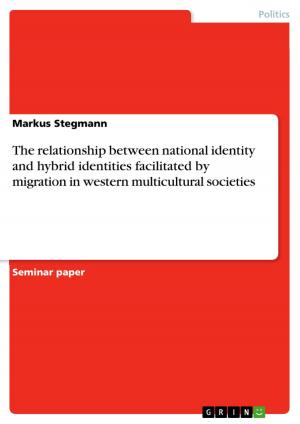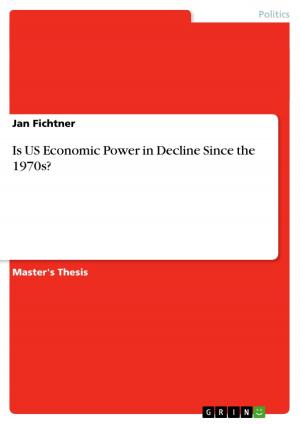Six Feet Under - The Death of American Parties
The Death of American Parties
Nonfiction, Social & Cultural Studies, Political Science| Author: | Anonymous | ISBN: | 9783640660650 |
| Publisher: | GRIN Publishing | Publication: | July 13, 2010 |
| Imprint: | GRIN Publishing | Language: | English |
| Author: | Anonymous |
| ISBN: | 9783640660650 |
| Publisher: | GRIN Publishing |
| Publication: | July 13, 2010 |
| Imprint: | GRIN Publishing |
| Language: | English |
Seminar paper from the year 2005 in the subject Politics - International Politics - Region: USA, grade: 2,0, Durham University, language: English, abstract: Due to my father's involvement in local politics, I was excited when election time came around. Even little children were showered with gifts, such as candy, sun visors, balloons, pens - and the list goes on. Seeing the party logo in bold letters on every imaginable item became an everyday experience. But it was after my grandfather had died that I had the most memorable experience concerning the German party system. My father had kept his party membership certificate, a book with smooth leather binding and a black, red, and golden tassel dangling from its spine. I asked my father whether my grandfather was still a member; he shock his head and told me: 'No, a party membership expires once the person has died.' It is striking, that this kind of regulating party identification by institutional and legal means is non-existent in the United States. What theories then describe the exceptional conceptualization of party identification in the American context and how has party identification developed over time in the U.S.? To answer these questions, major theories of party identification will be presented and the decline of party identification will be analyzed. In conclusion, evidence will show that American parties in the electorate are in a state of decline, which will have major consequences for the political and social landscape during the next few decades.
Seminar paper from the year 2005 in the subject Politics - International Politics - Region: USA, grade: 2,0, Durham University, language: English, abstract: Due to my father's involvement in local politics, I was excited when election time came around. Even little children were showered with gifts, such as candy, sun visors, balloons, pens - and the list goes on. Seeing the party logo in bold letters on every imaginable item became an everyday experience. But it was after my grandfather had died that I had the most memorable experience concerning the German party system. My father had kept his party membership certificate, a book with smooth leather binding and a black, red, and golden tassel dangling from its spine. I asked my father whether my grandfather was still a member; he shock his head and told me: 'No, a party membership expires once the person has died.' It is striking, that this kind of regulating party identification by institutional and legal means is non-existent in the United States. What theories then describe the exceptional conceptualization of party identification in the American context and how has party identification developed over time in the U.S.? To answer these questions, major theories of party identification will be presented and the decline of party identification will be analyzed. In conclusion, evidence will show that American parties in the electorate are in a state of decline, which will have major consequences for the political and social landscape during the next few decades.















